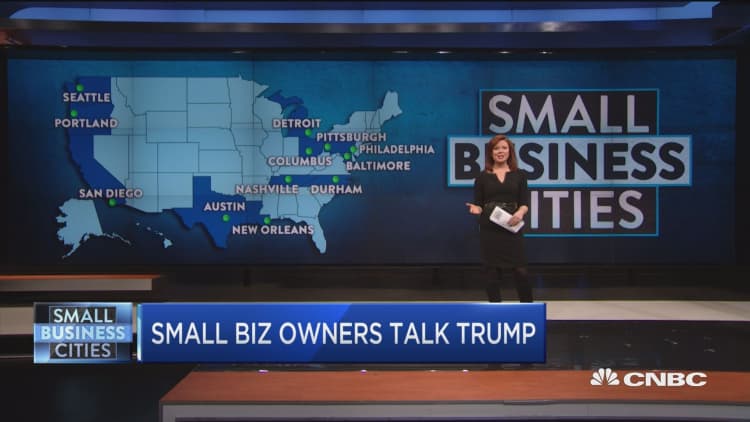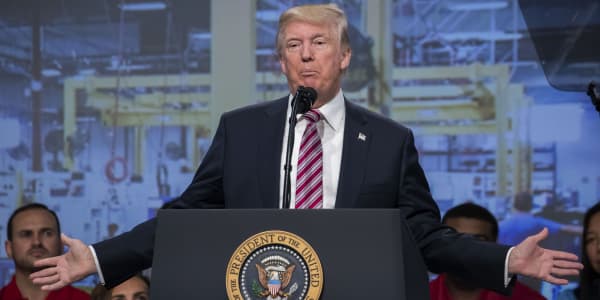
The past year has been a fairly strong one for small businesses, with both optimism and new company creation on the rise as the contingent awaits the Trump presidency in 2017.
A widely watched report from the Kauffman Foundation released earlier this year found annual start-up activity increased in 2016 for the second straight year after falling during the recession. New company creation was bolstered by growth among both women and minorities. More recent data, from the National Federation of Independent Business, found optimism levels after the election of Donald Trump at heights not seen in nearly a year.
But what lies ahead for Main Street remains to be seen, with 2017 just around the corner and a new administration right behind it. Over the past year, CNBC has profiled some 40 companies in 12 different cities across the country for our Small Business Cities series. Just over one month since the election, we checked in with some of the entrepreneurs we profiled to hear their thoughts on key small-business issues and prospects for next year.
Deregulation
Promises of deregulation and tax reform have been hallmarks of Trump's campaign that led him to the oval office. Some on Main Street are hoping for continued clawbacks on labor regulations, in the vein of the recent Department of Labor Overtime Rule that was halted by a federal judge in Texas. The rule would have doubled the salary threshold to about $47,000 a year for those workers who are eligible to receive overtime pay.
Others look forward to Trump's tax proposal that aims to lower corporate taxes to 15 percent. S-corps and pass-through entities would also be subject to a top tax rate of 15 percent.
Jeff Winkler, founder of Origin Code Academy in San Diego, is welcoming both the idea of lower taxes and less regulation. In May, Winkler had about 100 students in the coding classes he offers, a number that will more than double by the end of the year.
"As a business owner, you want to be pathologically optimistic and hope that moving forward, people with business experience making these policies will have a positive impact overall," Winkler said. If taxes were lowered and there was less regulation, he says good things lie ahead. "That would impact our business and allow us to hire teachers faster so we can provide more developers for San Diego in a very real way."
Detroit-based entrepreneur Eric Yelsma is also closely watching how Trump is assembling his new Cabinet and considering what it might mean for business. Yelsma founded his business, Detroit Denim, in 2009 alongside partner Brenna Lane after being laid off from his corporate job as a chemical salesman. Today he employs eight people, taking pride in teaching Detroiters new skills and creating jobs in the city.
"When I started this company, I had specific values about how I wanted it to run, how I wanted to treat people and how I wanted to hire and employ native Detroiters. So whatever happens is not going to change how we do business," Yelsma said of a Trump presidency. "It's imperative we make stuff in Detroit and make it better than anyone else. Whatever happens, we are still going to do that."
Minimum wage
While minimum wage is often a concern for Main Street companies, the start-ups featured in our Small Business Cities report this year didn't seem worried. The federal minimum wage has not been raised from its current $7.25 an hour since 2009, despite campaigning from the Obama Administration and congressional Democrats over the past several years. Trump had expressed support for a higher federal minimum, at $10 an hour, on the campaign trail, but a hike seems unlikely, given his nomination of fast-food executive Andy Puzder for Labor Secretary, who opposed efforts to raise the wage to $10. This, coupled with the fact that Congress is also Republican-controlled.
Yelsma said he was already paying above the local minimum in Detroit of $8.50 an hour. "We pay people more than minimum wage — we pay them what they deserve and what they earn," Yelsma said.
Whatever happens with the minimum wage, we will still be above that level."
The sentiment was echoed by Joe DeLoss, founder of Columbus, Ohio-based Hot Chicken Takeover. The restaurant is staffed by some 50 workers who have all been impacted by incarceration. He also pays "well over the minimum wage" of $8.10 an hour, with workers on average making between $12 and $13 an hour. In the next year, he hopes to triple the size of the team and open up several new locations, with fair pay continuing to be a core value for the restaurant.
"We know financial stability is a key indicator of the success of our company, and if our workforce is financially stable, they will be more productive and supportive of our growth," DeLoss said. "We are really dialed in to supporting increased wage growth for all of our team members. We are pretty far down that path with or without legislation."
Health-care reform
Another thing on Main Street's radar: the future of Obamacare and, in particular, the employer mandate. The law requires individuals to have health insurance, and small companies with at least 50 employers or more must offer their workers insurance — or pay fines of up to $2,000 per worker per year for failing to comply. The NFIB finds that the rising cost of health care was ranked the top issue for small companies in 2016, with 70 percent citing cost as their top concern. What's more, the National Small Business Association finds 42 percent of small businesses say they've contacted lawmakers about health-care costs.
DeLoss said his own workers aren't expressing concern about the future of the law. Currently, about one-third of the workforce is full-time at Hot Chicken Takeover, with access to employer-subsidized health care. "We provide an alternative insurance product that reduces the rate of some medical costs based on prenegotiated rates," he said.
But Yelsma is awaiting the future of President Obama's landmark reform act. "I do have staff that are on Obamacare," he said. "We don't offer any benefits now, but that is a goal of ours as we grow. It's one of the primary things we want to offer our staff here."
More from Small Business Cities:
How start-ups are helping to turn around the Big Easy
Baltimore is making a $5 billion bet that entrepreneurs can revive the city
Money is flowing to start-ups in a city far from Silicon Valley





